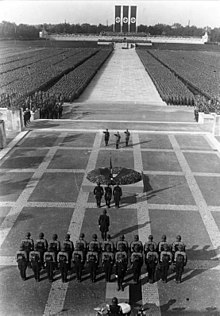History of propaganda
[2] The Roman Civil Wars (44–30 BCE) saw Octavian and Mark Antony accusing each other of obscure and dishonorable origins, cruelty, cowardice, incompetence in oratory and literature, debauchery, excessive luxury, drunkenness, and other slanders.
It was later found that some of these accounts were false stories created to perpetuate the common stereotypes of the native people of India as savages who needed to be civilised by British colonialists, a mission sometimes known as "the white man's burden".
Lastly came Augusta Jane Evans Wilson's Macaria; or, Altars of Sacrifice (1864), popular in the North and South, persuasively defended Confederate policy and predicted horrible consequences if the slaves were freed.
[28] In the late 19th and early 20th centuries, propaganda techniques became more refined and effective due to, on the one hand, the growth of new communication technologies (e.g. underseas cables, wireless radio, silent motion pictures), and on the other, the development of modern advertising and public relations.
[16] Gabriel Tarde's Laws of Imitation (1890) and Gustave Le Bon's The Crowd: A Study of the Popular Mind (1897) were two of the first codifications of propaganda techniques, which influenced many writers afterward, including Sigmund Freud.
D) The rhetoric exalted Germany's historic mission to promote high culture and true civilization, celebrating the slogan "work, order, duty" over the enemy's "liberty, equality, fraternity."
The Bureau began its propaganda campaign on 2 September 1914 when Masterman invited 25 leading British authors to Wellington House to discuss ways of best promoting Britain's interests during the war.
In early 1918 it was decided that a senior government figure should take over responsibility for propaganda and on 4 March Lord Beaverbrook, owner of the Daily Express newspaper, was made Minister of Information.
Propaganda experts Walter Lippmann and Edward Bernays participated in the Committee on Public Information (CPI), which was tasked with swaying popular opinion to encourage enlistment and war bond sales.
Their terminology included two terms: Russian: агитация (agitatsiya), or agitation, and Russian: пропаганда, or propaganda, see agitprop (agitprop is not, however, limited to the Soviet Union, as it was considered, before the October Revolution, to be one of the fundamental activities of any Marxist activist; this importance of agit-prop in Marxist theory may also be observed today in Trotskyist circles, who insist on the importance of leaflet distribution).
Vast numbers of human beings must cooperate in this manner if they are to live together as a smoothly functioning society.Walter Lippmann, returning from his post as an army propagandist, became a strong critic of the CPI.
All journalists, writers and artists were required to register with one of the Ministry's subordinate chambers for the press, fine arts, music, theatre, film, literature or radio.
"[73][74]The main part of this propaganda campaign was the false flag project, Operation Himmler, which was designed to create the appearance of Polish aggression against Germany, which was subsequently used to justify the invasion of Poland.
Motion pictures likely likewise were censored, and were encouraged to reinforce stereotypes to the effect that the French were always lovers of liberty and justice, contending against cruel and barbarous Germans.
[16] While the OWI focused on the home front, the Allies, and neutral countries, the military and the Office of Strategic Services (OSS) engaged in psychological warfare by directing propaganda against the Axis powers.
[84] In the US, animation became popular, especially for winning over youthful audiences and aiding the U.S. war effort, e.g., Der Fuehrer's Face (1942), which ridicules Hitler and advocates the value of freedom.
Some American war films in the early 1940s were designed to create a patriotic mindset and convince viewers that sacrifices needed to be made to defeat the Axis Powers.
Thomas Anthony Dooley III, a medical intelligence recruit, became the public face of Operation Passage to Freedom, a refugee program secretly designed by CIA officer Edward Lansdale.
The refugee surge from North to South appeared spontaneous to the American public, but was partly engineered by Lansdale's hoax threats of dropping nuclear bombs on Hanoi.
However, during the Nixon administration, revelations from the Pentagon Papers and about the My Lai Massacre and the war's expansion into Cambodia and Laos, exposed the government's secrecy and manipulation of information.
[106][107] At the turn of the 20th century, films emerged as the new cultural agents, depicting events and showing foreign images to mass audiences in European and American cities.
Though the Allied governments were slow to use film as a medium for conveying a desired position and set of beliefs, individuals, such as Charlie Chaplin were considerably more successful with The Bond and Zepped.
Walt Disney and Looney Tunes were among those that actively aided the U.S. war effort through their cartoons which provided training and instructions for viewers as well as a political commentary on the times.
[119][120] One of the conventions of the genre was to depict a racial and socioeconomic cross-section of the United States, either a platoon on the front lines or soldiers training on a base, which come together to fight for the good of the country.
"[129] Towards winning the hearts and minds of the MENA region, Al-Qaeda and its affiliates have produced propaganda films and documentaries depicting jihadist attacks, last will and testament videos, training, and interviews, all meant to boost morale among supporters.
Advances in fertilizers, herbicides, insecticides, fungicides, antibiotics, and growth hormones, reduced crop wastage due to weeds, insects, and diseases at the expense of health and safety from agricultural pollution.
[146] A lack of control on the acquired data's use has led to the widespread implementation of workplace propaganda created much more locally by managers in small and large companies, hospitals, colleges and Universities etc.
Historically, these efforts have evolved from being called "propaganda" by early Zionists, with Theodor Herzl advocating for such activities in 1899, to the more contemporary Hebrew term "hasbara" introduced by Nahum Sokolow, which translates roughly to "explaining".
[170] The goal of the operation is "to spread the administrations's talking points on Iraq by briefing ... retired commanders for network and cable television appearances," where they have been presented as independent analysts.
[175] In October 2018, The Daily Telegraph reported that Facebook "banned hundreds of pages and accounts which it says were fraudulently flooding its site with partisan political content – although they came from the US instead of being associated with Russia.
















